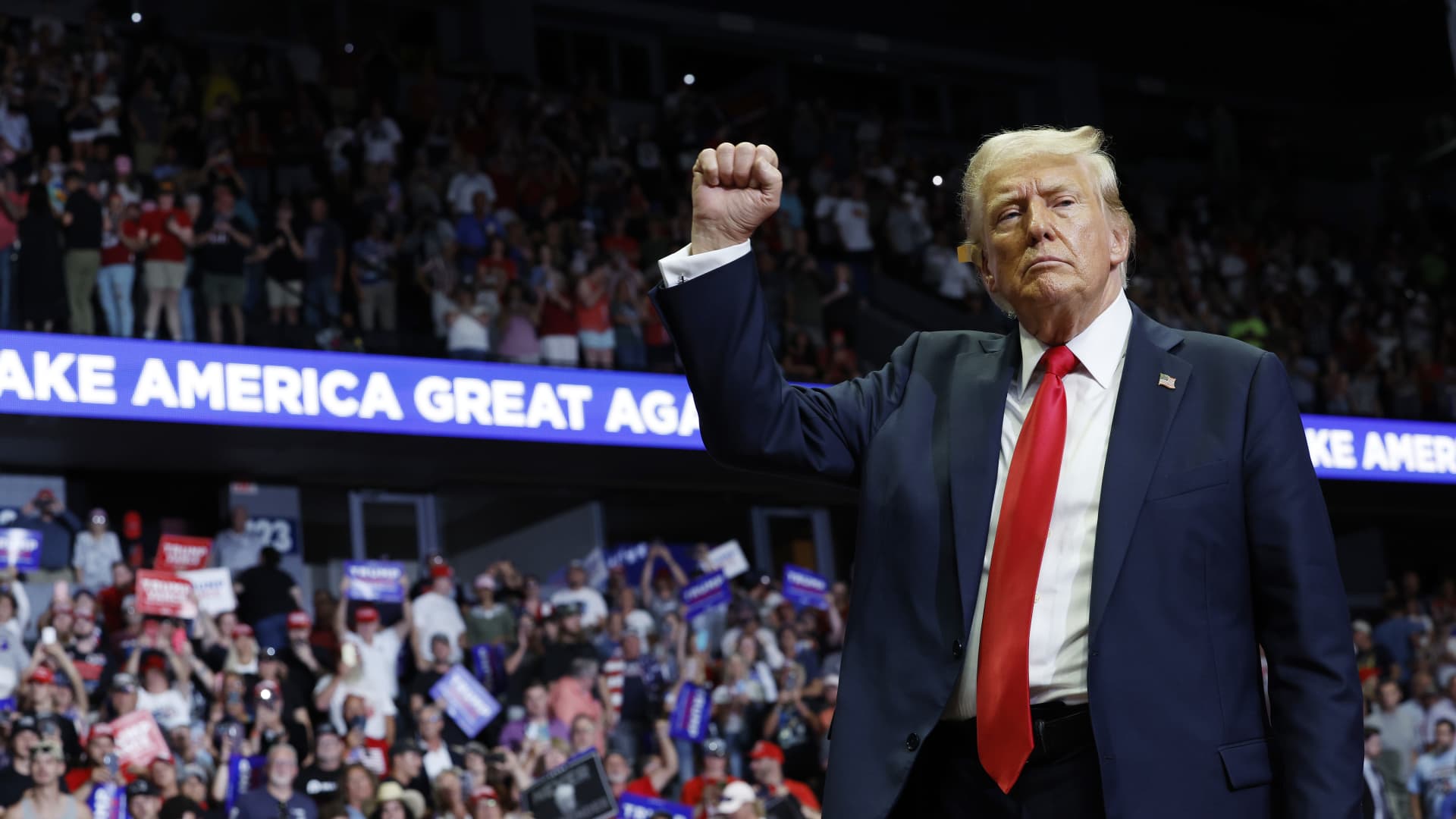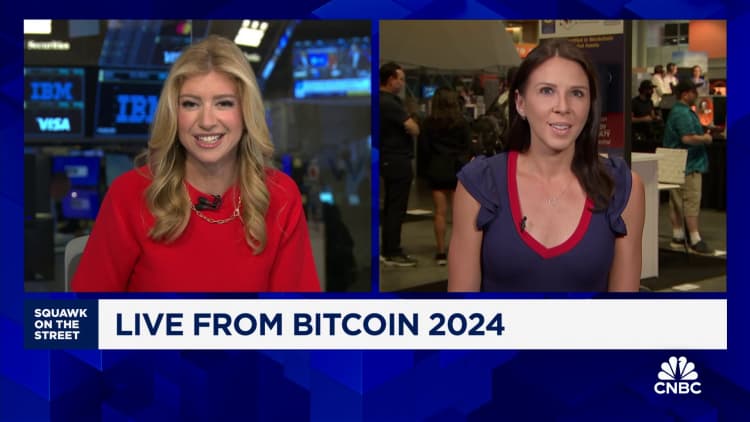Regulation
Trump propose de créer un stock stratégique national de crypto-monnaies lors de la conférence Bitcoin

Le candidat républicain à la présidence et ancien président américain Donald Trump quitte la scène après avoir pris la parole lors d’un rassemblement de campagne à la Van Andel Arena de Grand Rapids, Michigan, le 20 juillet 2024.
Anna Moneymaker | Getty Images
NASHVILLE — L’ancien président Donald Trump a déclaré que s’il était réélu à la Maison Blanche, il veillerait à ce que le gouvernement fédéral ne vende jamais ses avoirs en bitcoins. Mais il n’a pas proposé de créer une réserve fédérale officielle de monnaie numérique.
« Pendant trop longtemps, notre gouvernement a violé la règle cardinale que chaque bitcoiner connaît par cœur : ne vendez jamais vos bitcoins », a déclaré Trump lors de son discours d’ouverture à la conférence Bitcoin de cette année à Nashville, la plus grande conférence Bitcoin de l’année.
Les propos de l’ancien président ont été prononcés alors que la course pour capter les votes et l’argent de campagne des premiers utilisateurs de la fintech aux États-Unis occupe une place centrale dans la course présidentielle de 2024.
« Cet après-midi, j’expose mon plan pour garantir que les États-Unis seront la capitale de la crypto-monnaie de la planète et la superpuissance mondiale du bitcoin et nous y parviendrons », a déclaré Trump.
Mais la promesse de Trump de simplement maintenir les avoirs actuels en bitcoins du gouvernement américain était une proposition moins radicale adressée aux partisans de la cryptographie par rapport aux autres propositions présentées lors de la conférence.
Candidat tiers Robert F. Kennedy Jr.Par exemple, lors de son discours de vendredi à la conférence Bitcoin, Kennedy a promis de lancer une réserve de 4 millions de bitcoins, en commençant par les avoirs en bitcoins que le gouvernement américain a déjà accumulés à partir de saisies criminelles. Kennedy a déclaré qu’il obligerait le gouvernement à acheter 550 bitcoins par jour jusqu’à ce que la réserve atteigne 4 millions.
Peu de temps après le discours de Trump, la sénatrice Cynthia Lummis, républicaine du Wyoming, a lu sa propre proposition législative visant à constituer une réserve fédérale américaine officielle d’un million de bitcoins sur cinq ans.
« Il sera conservé pendant au moins 20 ans et pourra être utilisé dans un seul but : réduire notre dette », a déclaré Lummis.
Le prix du bitcoin a brièvement baissé pendant le discours de Trump, mais s’est redressé et était en légère hausse pour la journée, à 17h15 HE.
Tout au long de son discours, l’ancien président s’est efforcé d’établir des contrastes entre l’adoption croissante de la crypto-monnaie par le Parti républicain et l’approche réglementaire intransigeante qui a caractérisé l’administration Biden.
« La répression des cryptomonnaies et du bitcoin par l’administration Biden-Harris est une erreur et elle est très mauvaise pour notre pays », a déclaré Trump. « Laissez-moi vous dire que s’ils remportent cette élection, chacun d’entre vous sera parti. Ils seront vicieux. Ils seront impitoyables. Ils feront des choses que vous n’imagineriez pas. »
Trump a ensuite énuméré une série de promesses favorables aux crypto-monnaies devant une foule de partisans enthousiastes du bitcoin, promettant de démanteler ce qu’il a appelé la « croisade anti-crypto-monnaie » du président Joe Biden et de la vice-présidente Kamala Harris.
« Le premier jour, je virerai Gary Gensler », a déclaré Trump, faisant référence au président du conseil d’administration nommé par Biden. Commission de Sécurité et d’Echanges qui a adopté une approche agressive en matière de réglementation des crypto-monnaies.
Le président n’a pas le pouvoir de révoquer les commissaires nommés. Même si Trump devait nommer un nouveau président de la SEC, Gensler resterait commissaire au sein de l’agence indépendante.
L’ancien président s’est également engagé à créer un « conseil consultatif présidentiel sur le bitcoin et les crypto-monnaies ».
« Les règles seront écrites par des gens qui aiment votre industrie, et non par des gens qui la détestent », a déclaré Trump.
Le candidat républicain à la présidence a également organisé une collecte de fonds à Nashville, avec des billets culminant à 844 600 $En juin, le PDG de BTC Inc. David Baileyqui a organisé la conférence, s’est engagé à collecter 100 millions de dollars et à mobiliser plus de 5 000 000 d’électeurs pour l’effort de réélection de Trump, alors que le secteur du bitcoin se tourne de plus en plus vers le camp Trump pour obtenir du soutien.
La prise de la scène principale par Trump pour s’adresser directement à la communauté Bitcoin est la dernière d’une campagne de plusieurs mois visant à attirer le contingent crypto, notamment accepter des dons en jetons virtuelss’engageant à mettre fin à la « guerre contre la cryptographie » du président Joe Biden et préconisant que tous les futurs bitcoins seront fabriqués en AmériqueIl s’agit également d’un véritable revirement de la part du candidat républicain à la présidence.
Trump a été publiquement écarté Bitcoin quand il était à la Maison Blanche. Juillet 2019Il a déclaré qu’il n’était « pas un fan » du bitcoin et des autres crypto-monnaies. Il a déclaré que les jetons ne sont pas de l’argent, que leur valeur est « basée sur du vent » et a averti que les actifs cryptographiques non réglementés pourraient faciliter le trafic de drogue, entre autres « activités illégales ».
« Le bitcoin ressemble simplement à une arnaque », a-t-il déclaré à Fox lors d’une interview téléphonique en 2021. « Je ne l’aime pas parce que c’est une autre monnaie qui concurrence le dollar. »
“Je veux que le dollar soit la monnaie du monde, c’est ce que j’ai toujours dit”, a poursuivi Trump dans sa conversation avec Fox.
Mais cinq ans plus tard, une élection présidentielle perdue et des millions de dollars provenant du lobby cryptographique, le candidat républicain à la présidence a chanté les louanges de la monnaie numérique. La plus grande conférence Bitcoin de l’année à Nashville, qui a débuté jeudi.
« Le Bitcoin représente la liberté, la souveraineté et l’indépendance vis-à-vis de la coercition et du contrôle du gouvernement », a déclaré Trump lors de son discours d’ouverture.
Le changement d’attitude de Trump sur le bitcoin intervient alors que le Parti républicain s’engage à lever la bureaucratie de l’administration Biden-Harris, s’efforçant de faire de la réglementation des crypto-monnaies un enjeu de vote pour novembre, d’autant plus que l’inflation se classe régulièrement comme une priorité absolue des électeurs dans les sondages.
Alors que les lobbyistes et les partisans des crypto-monnaies deviennent de plus en plus présents à Washington, on peut se demander si le Parti démocrate va s’enfoncer dans l’approche réglementaire intransigeante des dernières années ou assouplir sa position.
« Chaque candidat à la présidence doit comprendre que les électeurs favorables aux actifs numériques et à l’innovation sont là pour rester », a déclaré le représentant démocrate Wiley Nickel de Caroline du Nord dans une interview à CNBC, ajoutant que la réglementation des crypto-monnaies ne devrait pas devenir un « enjeu politique partisan ».
« Je veux que ce sujet reste une question bipartite. Je ne veux pas que Donald Trump politise cette question », a déclaré le représentant Nickel.
Le représentant Ro Khanna, démocrate de Californie, a fait écho au sentiment du représentant Nickel, affirmant que la cryptographie ne devrait pas devenir un sujet de discussion partisan, mais nécessitera une réglementation comme toute technologie.
« Je ne vois pas vraiment pourquoi c’est partisan. Être contre le bitcoin, c’est comme être contre les téléphones portables. C’est comme être contre l’intelligence artificielle. C’est comme être contre les ordinateurs portables », a déclaré Khanna à CNBC. « C’est une technologie. Il faut mettre en place une réglementation réfléchie sur cette technologie, mais c’est une technologie qui a augmenté de 10 000 à 80 000 dollars. »
Les représentants Khanna et Nickel étaient deux des seuls démocrates à assister à la conférence Bitcoin.
Conférence Bitcoin 2024 Les organisateurs ont déclaré avoir brièvement discuté de la présence de la vice-présidente Kamala Harris à la conférence, mais elle a finalement refusé. Mais l’homme d’affaires milliardaire Mark Cuban a publié sur X que la campagne de Harris lui avait posé des questions sur la crypto-monnaie. Il semble donc que la vice-présidente étudie cet espace et détermine potentiellement où ses politiques, si elle est élue présidente, pourraient aboutir.
« Je pense que nous allons bientôt entendre la vice-présidente Harris à ce sujet. Et je suis très optimiste quant au fait que nous allons avoir une réinitialisation. Et je pense que cela aura une importance majeure », a déclaré le représentant Nickel. « Ce problème ne va pas disparaître. Et nous devons nous assurer de continuer à l’aborder de manière bipartite. »
L’équipe de Harris a déjà commencé à contacter des personnes proches des entreprises de crypto-monnaie pour organiser des réunions, a déclaré le Le Financial Times rapporté samedi.

Trump fait volte-face sur le bitcoin
Le récent dégel du sentiment de Trump à l’égard du secteur des actifs numériques a coïncidé avec un afflux soudain d’intérêt et d’argent de la part des meilleurs talents technologiques du pays.
Il a levé plus de 4 millions de dollars dans un mélange de crypto-monnaies, dont le bitcoin, l’éther, le stablecoin USDC indexé sur le dollar américain et divers memecoins, avec des contributeurs originaires de 12 États, dont quelques champs de bataille.
Les jumeaux milliardaires en crypto-monnaie et investisseurs en capital-risque Tyler et Cameron Winklevoss ont mené la charge, contribuant chacun à hauteur de 15,57 bitcoins, soit un peu plus d’un million de dollars au moment de leur don, selon un dossier auprès de la Commission électorale fédérale – bien qu’ils aient reçu un remboursement partiel, car les contributions ont dépassé la limite de 844 600 $.
Il existe un certain nombre d’autres capital-risqueurs qui sont favorables aux crypto-monnaies et qui ont également promis des millions à la campagne Trump.
Les capital-risqueurs Marc Andreessen et Ben Horowitz a dit aux employés d’Andreessen Horowitz (a16z) qui prévoient de faire des dons importants aux comités d’action politique soutenant la campagne de Trump. Les partenaires de Sequoia Capital soutiennent Trump, tout comme l’investisseur en capital-risque David Sacksqui a aidé l’ancien président à lever 12 millions de dollars lors d’une collecte de fonds qu’il a organisée dans sa maison de San Francisco. Les directeurs juridiques de l’échange centralisé de crypto-monnaies Coinbase et le géant de la blockchain Ripple étaient tous les deux là.
Ces membres de l’élite technologique contribuent également massivement aux super PAC pro-crypto comme Fairshake, qui a levé plus de 200 millions de dollars pour élire des candidats pro-crypto de haut en bas du scrutin, et des deux côtés de l’allée.
Mais selon les reportages de NBC News L’équipe du vice-président cherche à rallier le soutien de certains donateurs indécis des grandes entreprises technologiques, dont beaucoup sont restés sur la touche pendant que le président Joe Biden restait dans la course. Leur discours pourrait changer maintenant que le vice-président est le candidat de facto du parti.
Heureusement, Harris a une longue expérience en Californie.
Elle collecte des fonds dans la communauté technologique depuis des années, y compris auprès de ceux qui travaillent chez Amazone, Alphabet, Microsoft et Pomme.
« Le tournant qui s’est produit au cours des trois derniers jours est spectaculaire », a déclaré Steve Westly, un investisseur en capital-risque et ancien candidat au poste de gouverneur de Californie. a déclaré à NBC News« Je ne pense pas avoir jamais vu un tel élan d’enthousiasme dans aucune campagne à laquelle j’ai participé. »
Cela survient alors que le colistier de Trump à la vice-présidence, JD Vance, doit organiser sa propre collecte de fonds à Palo Alto lundi.
— Rebecca Picciotto de CNBC a contribué à ce reportage.
Regulation
Crypto community gets involved in anti-government protests in Nigeria

Amid the #EndBadGovernanceInNigeria protests in Nigeria, a notable shift is occurring within the country’s cryptocurrency sector. As the general public demands sweeping governance reforms, crypto community leaders are seizing the opportunity to advocate for specific regulatory changes.
Rume Ophi, former secretary of the Blockchain Stakeholders Association of Nigeria (SiBAN), stressed the critical need to integrate crypto-focused demands into the broader agenda of the protests.
Ophi explained the dual benefit of such requirements, noting that proper regulation can spur substantial economic growth by attracting investors and creating job opportunities. Ophi noted, “Including calls for favorable crypto regulations is not just about the crypto community; it’s about leveraging these technologies to foster broader economic prosperity.”
Existing government efforts
In opposition to Ophi’s call for action, Chimezie Chuta, chair of the National Blockchain Policy Steering Committee, presents a different view. He pointed out The Nigerian government continued efforts to nurture the blockchain and cryptocurrency industries.
According to Chuta, the creation of a steering committee was essential to effectively address the needs of the crypto community.
Chuta also highlighted the creation of a subcommittee to harmonize regulations for virtual asset service providers (VASPs). With the aim of streamlining operations and providing clear regulatory direction, the initiative involves cooperation with major organizations including the Securities and Exchange Commission (SEC) and the Central Bank of Nigeria (CBN). “Our efforts should mitigate the need for protest as substantial progress is being made to address the needs of the crypto industry,” Chuta said.
A united call for support
The ongoing dialogue between the crypto community and government agencies reflects a complex landscape of negotiations and demands for progress.
While actors like Ophi are calling for more direct action and the inclusion of crypto demands in protest agendas, government figures like Chuta are advocating for recognition of the steps already taken.
As protests continue, the crypto community’s push for regulatory reform highlights a crucial aspect of Nigeria’s broader fight to improve governance and economic policies. Both sides agree that favorable regulations are critical to the successful adoption and implementation of blockchain technologies, signaling a potentially transformative era for Nigeria’s economic framework.
Read also : OKX Exchange Exits Nigerian Market Amid Regulatory Crackdown
Regulation
Cryptocurrency Regulations in Slovenia 2024

Slovenia, a small but highly developed European country with a population of 2.1 million, boasts a rich industrial history that has contributed greatly to its strong economy. As the most economically developed Slavic nation, Slovenia has grown steadily since adopting the euro in 2007. Its openness to innovation has been a key factor in its success in the industrial sector, making it a prime destination for cryptocurrency enthusiasts. Many believe that Slovenia is poised to become a powerful fintech hub in Europe. But does its current regulatory framework for cryptocurrencies support such aspirations?
Let’s explore Slovenia’s cryptocurrency regulations and see if they can propel the country to the forefront of the cryptocurrency landscape. My expectations are positive. What are yours? Before we answer, let’s dig a little deeper.
1. Cryptocurrency regulation in Slovenia: an overview
Slovenia is renowned for its innovation-friendly stance, providing a supportive environment for emerging technologies such as blockchain and cryptocurrencies. Under the Payment Services and Systems Act, cryptocurrencies are classified as virtual assets rather than financial or monetary instruments.
The regulation of the cryptocurrency sector in Slovenia is decentralized. Different authorities manage different aspects of the ecosystem. For example, the Bank of Slovenia and the Securities Market Agency oversee cryptocurrency transactions to ensure compliance with financial laws, including anti-money laundering (AML) and terrorist financing regulations. The Slovenian Act on the Prevention of Money Laundering and Terrorist Financing (ZPPDFT-2) incorporates the EU’s 5th Anti-Money Laundering Directive (5MLD) and aligns with the latest FATF recommendations. All virtual currency service providers must register with the Office of the Republic of Slovenia.
2. Cryptocurrency regulation in Slovenia: what’s new?
Several notable developments have taken place this year in the cryptocurrency sector in Slovenia:
July 25, 2024:Slovenia has issued a €30 million on-chain digital sovereign bond, the first of its kind in the EU, with a yield of 3.65%, maturing on 25 November 2024.
May 14, 2024:NiceHash has announced the first Slovenian Bitcoin-focused conference, NiceHashX, scheduled for November 8-9 in Maribor.
3. Explanation of the tax framework for cryptocurrencies in Slovenia
The Slovenian cryptocurrency tax framework provides clear guidelines for individuals and businesses. According to the Slovenian Financial Administration, the tax treatment depends on the status of the trader and the nature of the transaction.
- People:Income earned from cryptocurrencies through employment or ongoing business activities is subject to personal income tax. However, capital gains from transactions or market fluctuations are exempt from tax.
- Companies:Capital gains from cryptocurrency-related activities are subject to a 19% corporate tax. Value-added tax (VAT) generally applies at a rate of 22%, although cryptocurrency transactions that are considered as means of payment are exempt from VAT. Companies are not allowed to limit payment methods to cryptocurrencies alone. Tokens issued during ICOs must follow standard accounting rules and corporate tax law.
4. Cryptocurrency Mining in Slovenia: What You Need to Know
Cryptocurrency mining is not restricted in Slovenia, but income from mining is considered business income and is therefore taxable. This includes rewards from validating transactions and any additional income from mining operations. Both individuals and legal entities must comply with Slovenian tax regulations.
5. Timeline of the development of cryptocurrency regulation in Slovenia
Here is a timeline highlighting the evolution of cryptocurrency regulations in Slovenia:
- 2013:The Slovenian Financial Administration has issued guidelines stating that income from cryptocurrency transactions should be taxed.
- 2017:The Slovenian Financial Administration has provided more detailed guidelines on cryptocurrency taxation, depending on factors such as the status of the trader and the type of transaction.
- 2023:The EU adopted the Markets in Crypto-Assets (MiCA) Regulation, establishing a uniform regulatory framework for crypto-assets, their issuers and service providers across the EU.
Endnote
Slovenia’s approach to the cryptocurrency sector is commendable, reflecting its optimistic view of the future of cryptocurrencies. The country’s balanced regulatory framework supports cryptocurrency innovation while protecting users’ rights and preventing illegal activities. Recent developments demonstrate Slovenia’s commitment to continually improving its regulatory environment. Slovenia’s cryptocurrency regulatory framework sets a positive example for other nations navigating the evolving cryptocurrency landscape.
Read also : Hong Kong Cryptocurrency Regulations 2024
Regulation
A Blank Sheet for Cryptocurrencies: Kamala Harris’ Regulatory Opportunity

photo by Shubham Dhage on Unsplash
As the cryptocurrency landscape continues to evolve, the need for clear regulation has never been more pressing.
With Vice President Kamala Harris now leading the charge on digital asset regulation in the United States, this represents a unique opportunity to start fresh. This fresh start can foster innovation and protect consumers. It can also pave the way for widespread adoption across industries, including real estate agencies, healthcare providers, and online gaming platforms like these. online casinos ukAccording to experts at SafestCasinoSites, these platforms come with benefits such as bonus offers, a wide selection of games, and various payment methods. Ultimately, all this increase in adoption could propel the cryptocurrency market forward.
With this in mind, let’s look at the current state of cryptocurrency regulation in the United States, a complex and confusing landscape. Multiple agencies, including the Securities and Exchange Commission (SEC), the Commodity Futures Trading Commission (CFTC), and the Financial Crimes Enforcement Network (FinCEN), have overlapping jurisdictions, creating a fragmented regulatory environment. This lack of clarity has stifled innovation as companies are reluctant to invest in the United States, fearing regulatory repercussions. A coherent and clear regulatory framework is urgently needed to realize the full potential of cryptocurrencies in the United States.
While the US struggles to find its footing, other countries, such as Singapore and the UK, are actively looking into the cryptocurrency sector by adopting clear and supportive regulatory frameworks. This has led to a brain drain, with companies choosing to locate in more conducive environments.
Vice President Kamala Harris has a unique opportunity to change that narrative and start over. Regulation of cryptocurrencies. By taking a comprehensive and inclusive approach, it can help create a framework that balances consumer protection with innovation and growth. The time has come for clear and effective regulation of cryptocurrencies in the United States.
Effective regulation of digital assets is essential to foster a safe and innovative environment. The key principles guiding this regulation are clarity, innovation, global cooperation, consumer protection, and flexibility. Clear definitions and guidelines eliminate ambiguity while encouraging experimentation and development to ensure progress. Collaboration with international partners establishes consistent standards, preventing regulatory arbitrage. Strong safeguards protect consumers from fraud and market abuse, and adaptability allows for evolution in response to emerging trends and technologies, striking a balance between innovation and protection.
The benefits of effective cryptocurrency regulation are multiple and far-reaching. By establishing clear guidelines, governments can attract investors and mainstream users, driving growth and adoption. This can, in turn, position countries like the United States as global leaders in fintech and innovation. Strong safeguards will also increase consumer confidence in digital assets and related products, increasing economic activity.
A thriving crypto industry can contribute significantly to GDP and job creation, which has a positive impact on the overall economy. Furthermore, effective regulation has paved the way for the growth of many businesses such as tech startups, online casinos, and pharmaceutical companies, demonstrating that clear guidelines can open up new opportunities without stifling innovation. This is a great example of how regulation can allay fears of regressive policies, even if Kamala Harris does not repeal the current progressive approach. By adopting effective regulation, governments can create fertile ground for the crypto industry to thrive, thereby promoting progress and prosperity.
Regulation
South Korea Imposes New ‘Monitoring’ Fees on Cryptocurrency Exchanges

Big news! The latest regulatory changes in South Korea are expected to impact major cryptocurrency exchanges like Upbit and Bithumb. Under the updated regulations, these platforms will now have to pay monitoring fees, which could cause problems for some exchanges.
Overview of new fees
In the latest move to regulate cryptocurrencies, the Financial Services Commission announced on July 1 the revised “Enforcement Order of the Act on the Establishment of the Financial Services Commission, etc.” update “Regulations on the collection of contributions from financial institutions, etc.” According to local legislation newsThe regulations require virtual asset operators to pay supervisory fees for inspections conducted by the Financial Supervisory Service starting next year. The total fees for the four major exchanges are estimated at around 300 million won, or about $220,000.
Apportionment of costs
Upbit, which holds a dominant market share, is expected to bear more than 90% of the total fee, or about 272 million won ($199,592) based on its operating revenue. Bithumb will pay about 21.14 million won ($155,157), while Coinone and GOPAX will contribute about 6.03 million won ($4,422) and 830,000 won ($608), respectively. Korbit is excluded from this fee due to its lower operating revenue.
Impact on the industry
The supervision fee will function similarly to a quasi-tax for financial institutions subject to inspections by the Financial Supervisory Service. The new law requires any company with a turnover of 3 billion won or more to pay the fee.
In the past, fees for electronic financial companies and P2P investment firms were phased in over three years. However, the taxation of virtual asset operators has been accelerated, reflecting the rapid growth of the cryptocurrency market and increasing regulatory scrutiny.
Industry reactions
The rapid introduction of the fee was unexpected by some industry players, who had expected a delay. Financial Supervisory Service officials justified the decision by citing the creation of the body concerned and the costs already incurred.
While larger exchanges like Upbit and Bithumb can afford the cost, smaller exchanges like Coinone and GOPAX, which are currently operating at a loss, could face an additional financial burden. This is part of a broader trend of declining trading volumes for South Korean exchanges, which have seen a 30% drop since the new law went into effect.
-

 Regulation12 months ago
Regulation12 months agoRipple CTO and Cardano founder clash over XRP’s regulatory challenges ⋆ ZyCrypto
-

 Regulation10 months ago
Regulation10 months agoNancy Pelosi Considers Supporting Republican Crypto Bill FIT21 – London Business News
-

 Videos11 months ago
Videos11 months agoCryptocurrency News: Bitcoin, ETH ETF, AI Crypto Rally, AKT, TON & MORE!!
-

 Regulation11 months ago
Regulation11 months agoBitcoin’s future is ‘bleak’ and ripe for regulation, says lead developer
-

 News9 months ago
News9 months agoAave Price Increases Following Whales Accumulation and V3.1 Launch
-

 Regulation9 months ago
Regulation9 months agoSouth Korea Imposes New ‘Monitoring’ Fees on Cryptocurrency Exchanges
-

 Regulation9 months ago
Regulation9 months agoA Blank Sheet for Cryptocurrencies: Kamala Harris’ Regulatory Opportunity
-

 Regulation9 months ago
Regulation9 months agoCryptocurrency Regulations in Slovenia 2024
-

 News11 months ago
News11 months agoThe trader earned $46 million with PEPE after reaching a new ATH
-

 Regulation11 months ago
Regulation11 months agoCrypto needs regulation to thrive: Tyler Cowen
-

 Blockchain11 months ago
Blockchain11 months agoSolana ranks the fastest blockchain in the world, surpassing Ethereum, Polygon ⋆ ZyCrypto
-

 Blockchain11 months ago
Blockchain11 months agoSolana Surpasses Ethereum and Polygon as the Fastest Blockchain ⋆ ZyCrypto

















